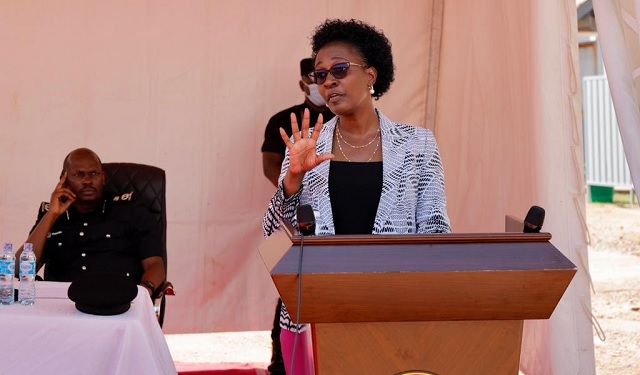
KAMPALA, UGANDA | THE INDEPENDENT | Anne Twinomugisha Muhairwe, the Deputy Inspector General of Government is under the spotlight for alleged environmental degradation, abuse of power, and torture following an incident involving Alex Katungi, a police officer from the environmental police unit.
In a complaint addressed to Inspector General of Government Beti Olive Kamya, Katungi’s lawyers, Mwesigwa Rukutana & Co. Advocates, outlined allegations stemming from an incident on January 19, 2025. “On 19h January 2025, our client, in the execution of his duties, inspected a suspected dumping/degradation of the environment contrary to Section 55 of the National Environment Act Cap 181, Laws of Uganda that restricts the use of wetlands. Upon further inquiry, he found that the degradation was being orchestrated by Mrs. Arın Muhairwe, Deputy Inspector General of Government, who admitted to owning the land,” the letter obtained by our reporters reads in part.
Despite the ongoing environmental violation, the Deputy IGG allegedly confronted Katungi, verbally abusing and intimidating him, and ordering him to leave the site. It is claimed that Muhairwe threatened Katungi, stating that she only fears the President, the First Lady, and the President’s brother, General Caleb Akandwanaho (Salim Saleh).
Fearful for his safety, Katungi left the scene and reported the incident to his supervisor, Commissioner of Police Enock Abaine. A formal complaint was filed at Kajjansi Police Station under Reference Number SD 65/20/01/25. The following day, January 20, Muhairwe allegedly contacted Katungi, inviting him to her office.
Upon his arrival, he was confronted by former convicts linked to environmental crimes. According to the letter, Muhairwe accused Katungi of assaulting these individuals and then coerced him into paying UGX 3,000,000 (three million Ugandan shillings) as damages to her son, Ronald Asiimwe, who is allegedly managing the site.
“Our client…was also further made to kneel, raise his hands, and forced to apologize to her said son – Ronald Asiimwe – while she was recording him, and threatened to share the recording on social media.” The letter, which was also copied to the Minister of Internal Affairs, the IGP, and the ED of NEMA, further claims.
Furthermore, it is alleged that Muhairwe pressured Katungi to halt his investigations and withdraw the case filed against her at Kajjansi Police Station, threatening that failure to comply would result in his “prosecution” and dismissal from the Police.
According to Katungi’s lawyers, these actions—ranging from abuse of power and harassment to environmental degradation—have sparked concerns about impunity within the Inspectorate of Government. To address this, they have appealed to the Inspector General of Government to take prompt action, calling for an end to the harassment and reminding Muhairwe that no one is above the law. By the time of filing this story, our reporters had not received responses from the accused official or the IGG’s office.
When contacted, Naomi Namara Karekaho, the Corporate Communications Manager at the National Environment Management Authority (NEMA), stated that she was unaware of the matter. “We have not received any formal complaint to that effect. This is the first time we are encountering the issue,” she noted in a message to our reporter.
Our reporters also reached out to several other individuals at NEMA and officers from the Police Environmental Protection Unit regarding the matter involving the Deputy IGG. All of them could not comment on this specific issue, but, they generally acknowledged that enforcing environmental laws often subjects them to resistance from individuals in positions of power or those with strong connections to influential figures.
“The rich and politically connected individuals believe they are above the law and can degrade the environment as they please. If you dare confront them on their property, they might be rough,” one individual said. The responses from individuals highlighted a pressing concern that has been raised over time by the public regarding the selective enforcement of environmental laws.
While the poor and marginalized are often evicted, sometimes brutally, from wetlands and other ecologically sensitive areas, the wealthy and influential continue to degrade the environment with little consequence.
In a social media campaign titled #UgandaWetlandExhibition, led by Agora Discourse—a digital public square advocating for human rights, public accountability, and social justice—members of the public shared posts highlighting prominent businesses and influential individuals responsible for degrading wetlands and the environment under the watch of environmental authorities.
The campaign drew attention to the perceived double standards, as the poor and underprivileged were evicted from wetlands while powerful entities remained untouched. The campaign followed the brutal evictions of individuals who had settled and claimed portions of the Lubigi wetland system.
*****
URN
 The Independent Uganda: You get the Truth we Pay the Price
The Independent Uganda: You get the Truth we Pay the Price



